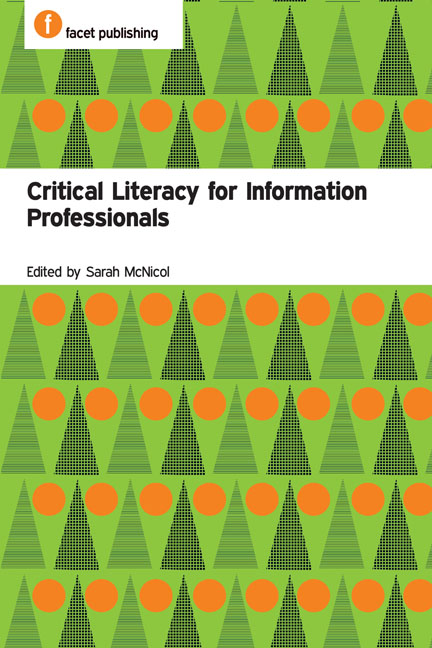Introduction
Published online by Cambridge University Press: 08 June 2018
Summary
What is critical literacy?
As is the case with information literacy, there is no single accepted definition of critical literacy. One way of describing critical literacy, however, is as a process that ‘challenges the status quo in an effort to discover alternative paths for self and social development’ (Shor, 1999). This description highlights two key components of critical literacy. Firstly, critical literacy is concerned with the social and cultural contexts in which texts (including not simply written texts, but digital texts, multimedia, visual materials and so forth) are both created and read. Secondly, critical literacy has a focus on practical action and community engagement; it is not concerned with merely abstract knowledge. The approach taken in critical literacy is not to read texts in isolation, but to develop an understanding of the cultural, ideological and sociolinguistic contexts in which they are created and read. The use of critical literacy involves a commitment to equity and social justice through the explicit inclusion of those marginalized on the basis of gender, sexuality, ethnicity, class or other forms of difference. Closely related to Paulo Freire's critical pedagogy, which he described in Pedagogy of the Oppressed (1970), critical literacy focuses on issues of power and is intended to develop the skills, dispositions and strategies to enable readers to challenge ‘text and life as we know it’ (McLaughlin and DeVoogd, 2004).
A fundamental notion of critical literacy is that all texts are constructed and serve particular interests. This means that it is important to consider who constructed a text and for what purpose. Furthermore, texts contain value messages; as texts are constructed by people, who all have their own views of the world, no text is completely neutral and objective. For example, when they write, an author or creator makes conscious and unconscious choices about what to include and exclude and how to represent the things or people they depict. However, it is not just the author who has an important role; equally, the reader is an active participant in creating meaning from the text. Just like authors, all readers bring different experiences and knowledge which help them to make meaning from a text. This means that each person interprets a text differently and multiple ways of reading a single text are not just possible, but inevitable.
- Type
- Chapter
- Information
- Critical Literacy for Information Professionals , pp. xi - xviiiPublisher: FacetPrint publication year: 2016



